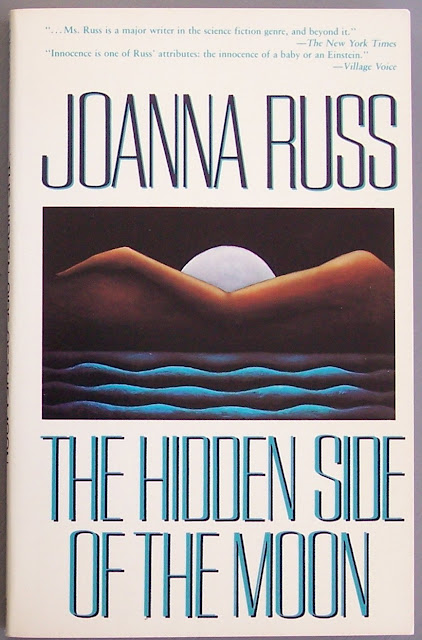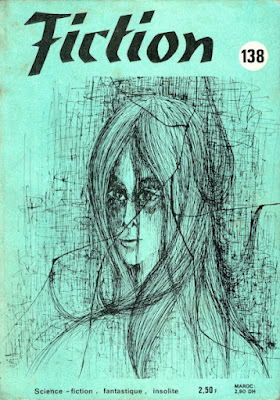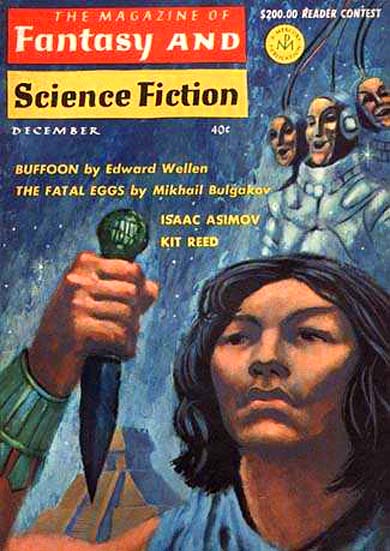These first three stories included in Russ's 1998 volume (and the last collection of her fiction to be offered during her lifetime) The Hidden Side of the Moon (St. Martin's Press). There was some critical consensus that this volume was "disappointing" after two, The Zanzibar Cat and (Extra)Ordinary People, which concentrated almost exclusively on her fantastic-fiction writing, but I'd disagree, given the general excellence of the work collected here (much of it more "challenging" than the earlier collections' contents); this volume does give a rather more wide-ranging account of her writing career, as well.
A (slightly-off-center) photo of the US trade paperback edition (which is the version I own).
"I Had Vacantly Crumpled It into My Pocket...But By God, Eliot, It Was a Photograph from Life!", The Magazine of Fantasy and Science Fiction, August 1964, edited by Avram Davidson; in the French edition, Fiction, May 1965, edited by Alain Dorémieux, as "La jeune fille en noir" (hence, the latter first appearance a weak excuse for inclusion here thus). Can be read here.
"Come Closer", Magazine of Horror, August 1965, edited by Robert A. W. Lowndes. Can be read here.
"Life in a Furniture Store", Epoch, Fall 1965, edited by Baxter Hutchison, A. R. Ammons, et al.; Managing Editor Barbara Hutchison. Can be read here.
...and a somewhat jokey, notional vignette, published as "Wilderness Year" (as Russ is quoted in the headnote as not being able to settle on a title), F&SF, December 1964, edited by Edward Ferman (though credited to his father, publisher Joseph Ferman) and never reprinted (hence a slightly less weak excuse for inclusion). Can be read here.
- 1 • The Little Dirty Girl • (1982) • novelette by Joanna Russ
- 23 • Sword Blades and Poppy Seed • (1983) • short story by Joanna Russ
- 29 • Main Street: 1953 • (1983) • short story by Joanna Russ
- 33 • How Dorothy Kept Away the Spring • (1977) • short story by Joanna Russ
- 42 • This Afternoon • (1968) • short story by Joanna Russ
- 49 • This Night, at My Fire • (1966) • short story by Joanna Russ
- 53 • "I Had Vacantly Crumpled It into My Pocket ... But By God, Eliot, It Was a Photograph from Life!" • [Cthulhu Mythos short fiction] • (1964) • short story by Joanna Russ
- 64 • Come Closer • (1965) • short story by Joanna Russ
- 70 • It's Important to Believe • (1980) • short story by Joanna Russ
- 71 • Mr. Wilde's Second Chance • (1966) • short story by Joanna Russ
- 74 • Window Dressing • (1970) • short story by Joanna Russ
- 81 • Existence • (1975) • short story by Joanna Russ
- 91 • Foul Fowl • (1971) • short story by Joanna Russ
- 95 • A Short and Happy Life • (1969) • short story by Joanna Russ
- 98 • The Throaways • (1969) • short story by Joanna Russ
- 103 • The Cliches from Outer Space • (1984) • short story by Joanna Russ
- 112 • Elf Hill • (1982) • short story by Joanna Russ
- 124 • Nor Custom Stale • (1959) • short story by Joanna Russ
- 138 • The Experimenter • (1975) • novelette by Joanna Russ
- 156 • Reasonable People • (1974) • short story by Joanna Russ
- 162 • Life in a Furniture Store • (1965) • short story by Joanna Russ
- 175 • The View from This Window • (1970) • novelette by Joanna Russ
- 195 • Old Pictures • (1987) • essay by Joanna Russ
- 197 • Visiting • (1967) • short story by Joanna Russ
- 200 • Visiting Day • (1970) • short story by Joanna Russ
- 206 • Old Thoughts, Old Presences • (1975) • short story by Joanna Russ
- 206 • The Autobiography of My Mother • (1975) • short story by Joanna Russ
- 218 • Daddy's Girl • (1975) • short story by Joanna Russ
- The Magazine of Fantasy and Science Fiction [v27 #2, No. 159, August 1964] (40¢, 132pp, digest, cover by James Roth) edited by Avram Davidson
- 4 • Editorial (F&SF, August 1964) • [Editorial (F&SF)] • essay by Avram Davidson
- 5 • A Bulletin from the Trustees of the Institute for Advanced Research at Marmouth, Mass. • short story by Wilma Shore
- 12 • "I Had Vacantly Crumpled It into My Pocket ... But By God, Eliot, It Was a Photograph from Life!" • [Cthulhu Mythos short fiction] • short story by Joanna Russ
- 22 • Books (F&SF, August 1964) • [Books (F&SF)] • essay by Avram Davidson
- 22 • Review: Davy by Edgar Pangborn • review by Avram Davidson
- 23 • Review: The Treasure of the Great Reef by Arthur C. Clarke and Mike Wilson (1934-1995) • review by Avram Davidson
- 23 • Review: The Wanderer by Fritz Leiber • review by Avram Davidson
- 24 • Review: The War in the Air by H. G. Wells • review by Avram Davidson
- 24 • Review: In the Days of the Comet by H. G. Wells • review by Avram Davidson
- 24 • Review: The Food of the Gods by H. G. Wells • review by Avram Davidson
- 26 • Review: Looking for the General by Warren Miller • review by Avram Davidson
- 27 • Poor Planet • novelette by J. T. McIntosh
- 54 • Nada • short story by Thomas M. Disch
- 71 • Hannes Bok (Obit) • essay by Avram Davidson
- 72 • The Red Cells • [The Science Springboard] • essay by Theodore L. Thomas
- 73 • Epitaph for the Future • poem by Ethan Ayer
- 74 • A Nice, Shady Place • (1963) • short story by Dennis Etchison
- 87 • Redman • short story by Robert Lipsyte and Thomas Rogers [as by Robert M. Lipsyte and Thomas Rogers]
- 95 • The Days of Our Years • [Asimov's Essays: F&SF] • essay by Isaac Asimov
- 105 • When the Change-Winds Blow • [Change War] • short story by Fritz Leiber
- 113 • In the Calendar of Saints • short story by Leonard Tushnet
- The Magazine of Fantasy and Science Fiction [v27 #6, No. 163, December 1964] (40¢, 132pp, digest, cover [for "Buffoon"] by Jack Gaughan) edited by Edward Ferman, as by publisher (and father) Joseph Ferman
- 5 • Buffoon • novelette by Edward Wellen
- 27 • The Man with the Speckled Eyes • short story by R. A. Lafferty
- 34 • Coming Next Month (F&SF, December 1964) • essay by Edward Ferman
- 35 • Plant Galls • [The Science Springboard] • essay by Theodore L. Thomas
- 36 • $200.00 Reader Contest • house ad (can you writer as story combining Buck's cited-below juxtaposition of the unicorn and the Univac computer?--among the winners was Gregory Benford)
- 36 • From Two Universes ... • poem by Doris Pitkin Buck (variant of From Two Universes)
- 37 • On the Orphans' Colony • short story by Kit Reed
- 43 • Wilderness Year • short story by Joanna Russ
- 44 • Somo These Days • poem by Walter H. Kerr
- 45 • A Galaxy at a Time • [Asimov's Essays: F&SF] • essay by Isaac Asimov
- 55 • Final Exam • short story by Bryce Walton
- 66 • The DOCS • short story by Richard O. Lewis
- 70 • Books (F&SF, December 1964) • [Books (F&SF)] • essay by Ron Goulart
- 70 • Review: Greybeard by Brian W. Aldiss • review by Ron Goulart
- 70 • Review: Martian Time-Slip by Philip K. Dick • review by Ron Goulart
- 71 • Review: Riddles of Astronomy by Otto O. Binder • review by Ron Goulart
- 71 • Review: Spectrum III edited by Kingsley Amis and Robert Conquest • review by Ron Goulart
- 71 • Review: The Pilgrim Project by Hank Searls • review by Ron Goulart
- 71 • Review: Gulliver of Mars by Edwin L. Arnold • review by Ron Goulart
- 72 • Review: The Dark Side of the Earth by Alfred Bester • review by Ron Goulart
- 72 • Review: The Plant, the Well, the Angel by Vassilis Vassilikos • review by Ron Goulart
- 74 • The Fatal Eggs • novella by (trans. of (1925) [as by Mikhail Bulgakov]
- 130 • Index to Volume Twenty Seven - July-December 1964 • [Index F&SF]
- Magazine of Horror [v2 #4, No. 10, August 1965] (50¢, 132pp, digest s/s, cover by Carl Kidwell) []
- 4 • Introduction (Magazine of Horror, August 1965) • [Editorial (Magazine of Horror)] • essay by Robert A. W. Lowndes
- 5 • The Girl at Heddon's • short story by Pauline Kappel Prilucik
- 19 • The Torture of Hope • (1945) • short story by Villiers de l'Isle-Adam (trans. of La torture par l'espérance 1883)
- 24 • The Cloth of Madness • (1920) • novelette by Seabury Quinn
- 45 • The Tree • short story by Gerald W. Page
- 51 • In the Court of the Dragon • [King in Yellow (Chambers)] • (1895) • short story by Robert W. Chambers
- 59 • The Reckoning (Magazine of Horror, August 1965) • [The Reckoning (Magazine of Horror)] • essay/reader poll results by Robert A. W. Lowndes [as by uncredited]
- 60 • Placide's Wife • [Nita Duboin] • (1931) • novelette by Kirk Mashburn
- 78 • Books (Magazine of Horror, August 1965) • essay by Robert A. W. Lowndes [as by RAWL]
- 78 • Review: Nightmare Need by Joseph Payne Brennan • review by Robert A. W. Lowndes [as by uncredited]
- 79 • Come Closer • short story by Joanna Russ
- 84 • Review: Tales of Science and Sorcery by Clark Ashton Smith • review by Robert A. W. Lowndes [as by RAWL]
- 84 • Review: Portraits in Moonlight by Carl Jacobi • review by Robert A. W. Lowndes [as by RAWL]
- 86 • The Plague of the Living Dead • (1927) • novella by A. Hyatt Verrill
- 122 • It Is Written ... (Magazine of Horror, August 1965) • [It Is Written] • letter column conducted by Robert A. W. Lowndes [as by uncredited]
- 124 • Letter (Magazine of Horror, August 1965) • essay by Donald A. Wollheim
- 126 • Letter (Magazine of Horror, August 1965) • essay by Hank Luttrell
- 127 • The Devil's Pool (excerpt) • short fiction by Greye La Spina (house ad for next issue)
- Publication: Fiction, #138
(View All Issues) (View Issue Grid) - Editor:
- Date: 1965-05-00
- Publisher: OPTA
- Price: F2.50
- Pages: 164
- Format: digest
- Type: MAGAZINE
- Cover: Fiction, #138 by Yvonne Gassinot
- Notes: Translated by diverse hands.
- 11 • Le réfractaire • short fiction by F. L. Wallace (trans. of Privates All 1961) [as by Floyd L. Wallace]
- 60 • La tunique de Nessa • short story by [as by and Luc Vigan]
- 74 • Fin de contact • short story by Michel Demuth [as by Jean-Michel Ferrer]
- 76 • La jeune fille en noir • [Cthulhu Mythos short fiction] • short fiction by Joanna Russ (trans. of "I Had Vacantly Crumpled It into My Pocket ... But By God, Eliot, It Was a Photograph from Life!" 1964)
- 87 • Aussi longtemps que le soleil • short fiction by Avram Davidson (trans. of Or the Grasses Grow 1958)
- 96 • Le portrait de Belle • short fiction by Michel Mardore
- 127 • • short fiction by Alejandro Jodorowsky [as by Alexandro Jodorowsky]
- 130 • Les frères siamois • interior artwork by Roland Topor [as by Topor]
- 133 • Ici, on désintègre ! (Fiction #138) • [] • essay by and Pierre Strinati and
- 133 • Review: Aux hommes, les étoiles by James Blish • review by
- 143 • Un précis du sublime • [] • essay by Jacques Goimard
- 148 • La décrue • [] • essay by Jacques Goimard
- 149 • Echange de reines • [] • essay by Jean-Paul Torok
- 151 • Mélusine avant le cri • [] • essay by Jean-Paul Torok
- 154 • Revue des arts (Fiction #138) • [Revue des arts (Fiction)] • essay by Anne Tronche
- 156 • La science-fiction dépassée • essay by
- 158 • Premier salon des bandes dessinées • essay by Michel Frainier and Pierre Strinati
Bibliography of Russ's work by Ethan Robinson
Demand My Writing, a study by Jeanne Cortiel
Gary Farber, a friend of Russ's in her later years, was moved to comment on Facebook about this post:
for more of today's SSW reviews & more, please see Patti Abbott's blog






.jpg)
Have you talked about Joanna Russ before? Her name isn't familiar to me, but then there are a lot of fantasy and science fiction authors I don't know much about. I love the cover of THE HIDDEN SIDE OF THE MOON.
ReplyDeleteI know some SF fans were hostile to Joanna Russ. I liked her early work and haven't read her later work.
ReplyDeleteTracy--thanks for pointing out that I've not put a link in for all the Joanna Russ content on the blog, an oversight; I've written a fair amount about her work, and some other posts include simply a citation or so in the course of describing other contents of a magazine issue or anthology. She came closest to making a lot of money from her work with the (fairly brilliant) novel THE FEMALE MAN, which was one of two 1970s Bantam sf paperback originals to really take off in sales as well as critical acclaim (the other being her friend Samuel Delaney's DHALGREN, if anything a more difficult text to parse, and a very long novel), from a line Frederik Pohl edited after leaving GALAXY and IF magazines and a brief term editing at the newly-purchased Ace Books around the turn of the '70s. She traded characters with her other friend Fritz Leiber for one story each, featuring her character Alyx and his Fafhrd, both a sort of stand-in for themselves in the series of sophisticated adventure-fantasies they wrote...and like Leiber, some of her earliest work in fantastica, as well as some or her best and her last, was horror fiction, though she wrote other sorts of fiction as well, including sf, fantasy and contemporary mimetic, among much else.
ReplyDeleteGeorge--some fans are hostile to just about anyone and anything, and Russ was no retiring character when it came to making her opinions known. Even relatively (for her) late fiction such as "My Boat" is charming fun, while other stories dig a bit harder into the human condition, including, rather obviously, her rejection of the Women Will Do Their Repopulation Duty fiction, all too common in sf at the time and if anything even more so in the previous decades, WE WHO ARE ABOUT TO...; parts of this and some of her other best fiction appeared in GALAXY as edited by James Baen in the '70s, who would go on to publish both Russ and no few of the Women's Duty writers in his editing at Ace Books and Baen Books in years to come...
ReplyDeleteWE WHO ARE ABOUT TO... was written specifically as a reply to Marion Zimmer Bradley's DARKOVER LANDFALL which endorsed rape as necessary for the unintended colony stemming from a spaceship crash to generate a widespread enough gene-pool.
ReplyDeleteAnd a strange postulate for even a Very Grumpy woman writer to put forward; such precedents as Randall Garrett's "Queen Bee" (where one hoped this was simply an expression of Garrett's questionable sense of humor) also Didn't Help.
ReplyDelete